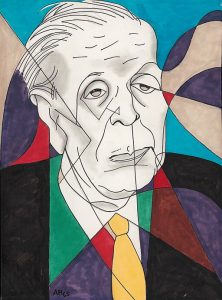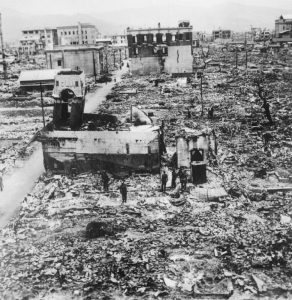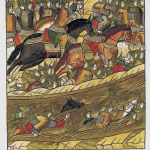Today’s task, because I had that rarest of commodities, time, was clearing off the bedside table and putting away the barely contained pile of stuff that had accumulated there. I began on a sudden whim, and less than an hour later, the entire junk-filled surface was completely decluttered and the remaining necessaries stowed in several small trays placed there for that purpose.
What remained unstowed were the various notes-to-self written on whatever was at hand, forming a motley assortment of papers and ideas from the last few months.
1. On a three-inch square piece of blue memo paper:
Thrill of fear
of hope
Solemnities
Solemnize
—
At the time I wrote this, I must have had a scare which led me to ruminate on the feeling that one experiences with a sudden flash of fear. It runs through your body like an electrical vibration causing every cell to quiver with unpleasant excitement. The same could be true when you think you’re doomed and then something happens to give you hope — the feeling of relief flows through you like a current.
As for ‘solemnities’ and ‘solemnize,’ it would seem these notes might be related to the Inauguration of Donald Trump, which Trump failed to solemnize when he repeated the oath of office without putting hand on the Bible, in a manner reminiscent of Napoleon Bonaparte who famously took the crown from the Pope’s hands and placed it on his own head. There is an element of the sacred to the idea of solemnities. Weddings are said to be solemnized.
2. “The subconscious is the locked room—like the IT departments at some banks to which no one but staff have access. It has windows and sometimes you can see in but you can never see anything going on. Maybe it’s uninhabited? But no, because sometimes your subconscious sends you messages—through your dreams or in synchronicities and omens (and random inspired thoughts) during waking life. Someone is in there but who?
I’m determined to figure out the answer to life, the universe, and everything. Also human beings. What? Why?”
—
Indeed, questions of a lifetime.
3. “Knowledge is power”
—
My question at the time was: if knowledge is power, why do humans so often avoid having any? We trust machines with everything, including human knowledge, as if someone else could “know” something for you.
4. “Saying that an AI bot ‘writes’ music misses the point of music. Generic ‘music’ for commercial reasons is one thing and AI can generate that all day long. But, music as art is completely different and can only be composed by a living person. AI has no living tissue, hence no emotions…”
—
Ah, the constant urge to rebut AI. Pointless–because it’s going to happen anyway—but satisfying, because I’m right. 😉
5. “AI isn’t going to be better than us. It’s going to be us on steroids.”
(AI moment)
—
See 4 above.
6. A full page document entitled “Current Schedule.” The document begins “Is it light out? Wake up.”
—
This schedule felt kind of aspirational when I first wrote it down but I actually follow it, more or less, although I’m not usually up at dawn, nor have I been successful at limiting my news reading to a “glance” in the morning.
7. “Whenever you start to feel worried or anxious, ask yourself: ‘When is it a good time to worry?’ Then answer yourself: ‘Never!’ and relax.
—
This has been a very helpful adage ever since I made it up.
Reading through this latest harvest of urgent, self-generated paper memes (“meme to self”), I find that my primary concern is with life’s eternal questions, and especially with human nature — who and what are we? Why do we aspire to be better than we seem wired to be? Another theme is all the reasons AI is horrible. And finally there’s a smattering of philosophical, psychological, and linguistic questions, with politics lurking underneath.
Having written these down, I feel I have done my duty in preserving whatever it was I thought was so important when I first recorded these notes. But when you’re trying to find the answer to life, the universe, and everything, anything could be a clue. It doesn’t pay to take chances.








